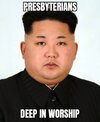Regarding the first question, I'd simply say that, as with any given passage of Scripture, statements in the Psalms must be interpreted in context. That includes the consideration of whether the action referenced is an aspect of ceremonial worship. These things take wisdom, and are not always easy.
Regarding the references you bring up, I don't see why they can't all be understood as references to prayer. The psalmist speaks of praise, but it is not necessary to understand him as speaking of sung praise. We praise, or bless, God in prayer as well.
We know from other portions of Scripture that uplifted hands are an aspect of the formal posture of public prayer. There is no difficulty understanding the passages cited in this way. The burden of proof would be on those who argue 1) for uplifted hands being a part of the formal posture for singing, or 2) that we are warranted to spontaneously lift our hands during various parts of public worship.



